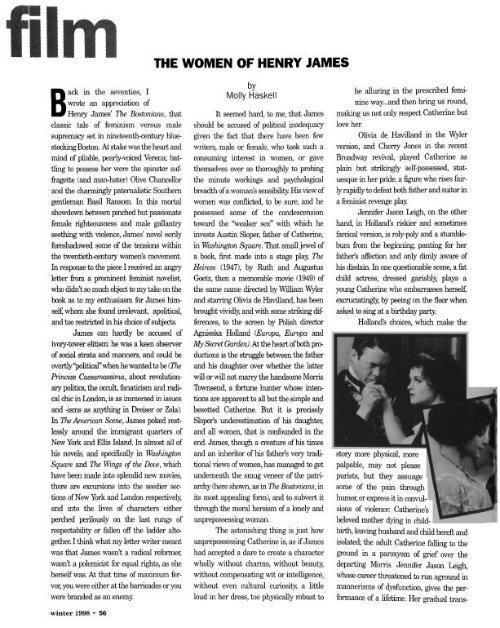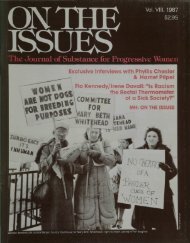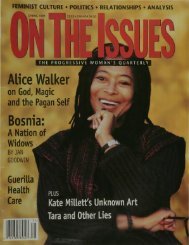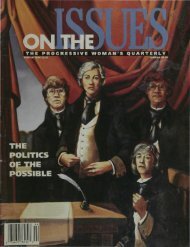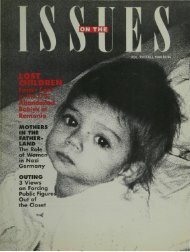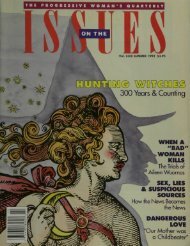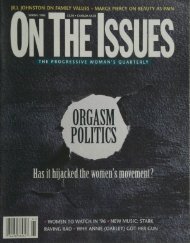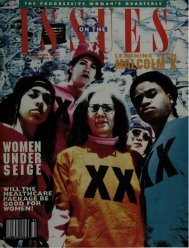women histories, incest sexual abuse. institutionalized. But what if ...
women histories, incest sexual abuse. institutionalized. But what if ...
women histories, incest sexual abuse. institutionalized. But what if ...
You also want an ePaper? Increase the reach of your titles
YUMPU automatically turns print PDFs into web optimized ePapers that Google loves.
film THE<br />
Back in the seventies, I<br />
wrote an appreciation of<br />
Henry James' The Bostonians, that<br />
classic tale of feminism versus male<br />
supremacy set in nineteenth-century bluestocking<br />
Boston. At stake was the heart and<br />
mind of pliable, pearly-voiced Verena; ba1><br />
tling to possess her were the spinster suffragette<br />
(and man-hater) Olive Chancellor<br />
and the charmingly paternalistic Southern<br />
gentleman Basil Ransom. In this mortal<br />
showdown between pinched but passionate<br />
female righteousness and male gallantry<br />
seething with violence, James' novel eerily<br />
foreshadowed some of the tensions within<br />
the twentieth-century <strong>women</strong>'s movement.<br />
In response to the piece I received an angry<br />
letter from a prominent feminist novelist,<br />
who didn't so much object to my take on the<br />
book as to my enthusiasm for James himself,<br />
whom she found irrelevant, apolitical,<br />
and too restricted in his choice of subjects.<br />
James can hardly be accused of<br />
ivory-tower elitism: he was a keen observer<br />
of social strata and manners, and could be<br />
overtly "political" when he wanted to be (The<br />
Princess Cassamassima, about revolutionary<br />
politics, the occult, fanaticism and radical<br />
chic in London, is as immersed in issues<br />
and -isms as anything in Dreiser or Zola).<br />
In The American Scene, James poked restlessly<br />
around the immigrant quarters of<br />
New York and Ellis Island. In almost all of<br />
his novels, and spec<strong>if</strong>ically in Washington<br />
Square and The Wings of the Dove, which<br />
have been made into splendid new movies,<br />
there are excursions into the seedier sections<br />
of New York and London respectively,<br />
and into the lives of characters either<br />
perched perilously on the last rungs of<br />
respectability or fallen off the ladder altogether.<br />
I think <strong>what</strong> my letter writer meant<br />
was that James wasn't a radical reformer,<br />
wasn't a polemicist for equal rights, as she<br />
herself was. At that time of maximum fervor,<br />
you were either at the barricades or you<br />
were branded as an enemy<br />
winter 1998 - 56<br />
WOMEN OF HENRY JAMES<br />
by<br />
Molly Haskell<br />
It seemed hard, to me, that James<br />
should be accused of political inadequacy<br />
given the fact that there have been few<br />
writers, male or female, who took such a<br />
consuming interest in <strong>women</strong>, or gave<br />
themselves over so thoroughly to probing<br />
the minute workings and psychological<br />
breadth of a woman's sensibility. His view of<br />
<strong>women</strong> was conflicted, to be sure, and he<br />
possessed some of the condescension<br />
toward the "weaker sex" with which he<br />
invests Austin Sloper, father of Catherine,<br />
in Washington Square. That small jewel of<br />
a book, first made into a stage play, The<br />
Heiress (1947), by Ruth and Augustus<br />
Goetz, then a memorable movie (1949) of<br />
the same name directed by William Wyler<br />
and starring Olivia de Havilland, has been<br />
brought vividly, and with some striking d<strong>if</strong>ferences,<br />
to the screen by Polish director<br />
Agnieska Holland (Muropa, Europa and<br />
My Secret Garden). At the heart of both productions<br />
is the struggle between the father<br />
and his daughter over whether the latter<br />
will or will not marry the handsome Morris<br />
Townsend, a fortune hunter whose intentions<br />
are apparent to all but the simple and<br />
besotted Catherine. <strong>But</strong> it is precisely<br />
Sloper's underestimation of his daughter,<br />
and all <strong>women</strong>, that is confounded in the<br />
end. James, though a creature of his times<br />
and an inheritor of his father's very traditional<br />
views of <strong>women</strong>, has managed to get<br />
underneath the smug veneer of the patriarchy<br />
(here shown, as in The Bostonians, in<br />
its most appealing form), and to subvert it<br />
through the moral heroism of a lonely and<br />
unprepossessing woman.<br />
The astonishing thing is just how<br />
unprepossessing Catherine is, as <strong>if</strong> James<br />
had accepted a dare to create a character<br />
wholly without charms, without beauty,<br />
without compensating wit or intelligence,<br />
without even cultural curiosity, a little<br />
loud in her dress, too physically robust to<br />
be alluring in the prescribed feminine<br />
way...and then bring us round,<br />
making us not only respect Catherine but<br />
love her.<br />
Olivia de Havilland in the Wyler<br />
version, and Cherry Jones in the recent<br />
Broadway revival, played Catherine as<br />
plain but strikingly self-possessed, statuesque<br />
in her pride, a figure who rises fairly<br />
rapidly to defeat both father and suitor in<br />
a feminist revenge play<br />
Jenn<strong>if</strong>er Jason Leigh, on the other<br />
hand, in Holland's riskier and sometimes<br />
farcical version, is roly-poly and a stumblebum<br />
from the beginning, panting for her<br />
father's affection and only dimly aware of<br />
his disdain. In one questionable scene, a fat<br />
child actress, dressed garishly, plays a<br />
young Catherine who embarrasses herself,<br />
excruciatingly, by peeing on the floor when<br />
asked to sing at a birthday party<br />
Holland's choices, which make the<br />
story more physical, more<br />
palpable, may not please<br />
purists, but they assuage<br />
some of the pain through<br />
humor, or express it in convulsions<br />
of violence: Catherine's<br />
beloved mother dying in child-1<br />
birth, leaving husband and child bereft and<br />
isolated; the adult Catherine falling to the<br />
ground in a paroxysm of grief over the<br />
departing Morris. Jenn<strong>if</strong>er Jason Leigh,<br />
whose career threatened to run aground in<br />
mannerisms of dysfunction, gives the performance<br />
of a l<strong>if</strong>etime. Her gradual trans-


